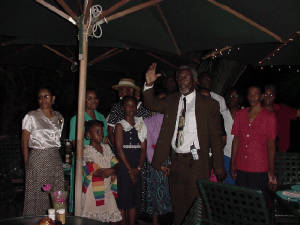|

|
| Island Sunset |
Oh, the places you'll go, written by Dr. Seuss was a favorite of my children. They loved thinking about possibilities
and adventures that could one day become a part of their lives. In like fashion, there are growing numbers of possibilities
and adventures that are available to social work students interested in international field practica.
Since 1995, as a faculty member at the University of Southern Mississippi (USM), I have taught study abroad
courses in Jamaica. Thus far, I have had about 75 MSW and BSW students from accredited social work programs across the USA
to travel and study with me. The majority of my students have been from the southeast (Mississippi, Alabama, Louisiana) but
every year there are some students that come from “distant” lands like Michigan, Ohio, Indiana, and Arizona, to
name a few.
After my first trip to Jamaica I began dreaming about creating international field practica for BSW and
MSW students. It finally happened in the spring of 2001 and the fall of 2002. The first semester I sent an MSW student to
Kingston (urban) and the second semester a BSW to St. Ann Parish (rural).
So, what are some issues that need to be considered before sending a sending a social work student abroad
for a practicum? The following are some basis ideas about what I think should be done in advance of a practicum as well as
what needs to be done to support students while they are abroad.
Setting Up the Field Practicum
Screen your students
Require students to complete a 14-20 day study abroad course in the country where they intend to do their field practicum,
especially if it is in a developing country. It is imperative for students to have some realistic perception of what life
would be like in that country. Most Americans have no idea of what is involved in living for an extended time period away
from their “creature comforts.”
Select students who are flexible and independent.
Flexibility is important because they must adjust to new, unanticipated situations involving great ambiguity.
Rigidity and inflexibility will hinder students’ effectiveness when working in agencies whose manner of doing work,
at least to an outsider, appears inefficient and casual.
Identify those students who will represent you and your university most positively.
The students you place abroad are inextricably linked to you and your university. Everything that they
do professionally or socially is directly linked to you. Some students may not cope well with this type of exposure and pressure.
They need to know that they will be “watched” all the time. They won’t easily blend into the crowd. You
must be certain that your student will do quality work and will represent you positively to your existing and future contacts.
I truly believe that I have lots at stake when I am sending a student abroad.

|
| Choir in St. Thomas |
Know your MSW supervisor
I am unwilling to send a student to a practicum unless the supervisor is an MSW. In my case, the supervisors
I was able to use were both Jamaicans and they had been trained in the USA or Canada. Furthermore, I had established relationships
with them over the course o f 5 years. I knew them pretty well and had some idea
of how their agencies operated. Before sending a student, I had to know that my contacts would watch out for them. I had to
believe that they would call me if things weren’t working out or if the student was engaged in risk taking behavior.
I had to know them well enough to trust them.
Secure safe living arrangements
Finding safe living arrangements is as essential as ensuring quality supervision.
Students must have space that can be called their own – at least for the semester. Although some would disagree with
this, they need few amenities with the exception of a telephone line, or access to one. My preference is to see the “apartment”
first hand. Although I tried to set up housing every summer, the timing was never right. I ended up in both cases, working
through the field supervisor and other in-country contacts. In both cases, the housing worked out well.
Develop a plan for seminar and assignments
Plan to keep students connected to their peers back home who are enrolled in seminar during the same semester.
My students wanted to have regular contact with their on-campus cohort. We attempted webcams but were unable to host (on my
PCs on campus) multiple students connecting from remote sites. The time-lags were to great. We eventually defaulted to a more
primitive yet dependable technology – telephone conference calls. The calls were lengthy but they enabled us to host
multiple students at the same time. I have not been able to work out in-country seminars but I would encourage faculty to
set them up when possible. I could never logistically work it out. While potentially having in country seminars would offer
some advantages it would not replace the seminar with which the student identifies back on the home campus. That weekly connection
to the home seminar is very important.
It is useful for students to prepare for practice and life in-country with some pre-travel assignments.
Have them read as much as you can. They should be familiar with World Bank and IMF policies along with UN Declarations on
Human Rights. The syllabus for field seminar also needs to include some unique assignments that require the student to explore
their experience working and living in another culture.
Extra costs
Living expenses in the USA were very comparable to what they were in Jamaica. Unlike taking a course in
the USA, I required students to purchase a laptop and webcam that used the same software that was on my PC. In the future,
I plan to charge students an extra “international” fee to cover USM’s extra expenses for the long distance
telephone calls related to the weekly seminars.

|
| Junkanoo in the Bahamas |
Supporting the Field Practicum
Preparations are made and your student has arrived in the host country. Beyond finding the food they like
to eat and navigating transportation systems, what are some of the issues that a faculty member must keep in mind to support
that student in the international practicum?
Isolation / loneliness
About 3-4 weeks into the practicum students begin to get lonely. They feel isolated and disconnected from
their friends and family back home. By this time in the semester some of the “adventure” of the practicum and
the “adrenaline rush” of being a new arrival has worn off. Now they have time to think. They are actually faced
with free time and don’t know what to do with it. A student’s laptop and when possible a short wave radio can
be an important survival tools for keeping up with the “rest of her life”.
Helplessness
The realities of working in a developing country places students in a position where they must daily face
the horrors of poverty. They are not only faced with the horror of a poverty level they could never have imagined possible
but now must work with clients trapped by its influence. The economic struggles faced by children and families as well as
their limited hope for the future are overwhelming. Simultaneously, there is growing doubt as to the adequacy of the existing
social welfare system to respond. The combination of these two realities can very easily turn into an overwhelming sense of
personal hopelessness.
Country shock
It is very difficult for students, even with little agency experience, to refrain from projecting their
own American “ways of doing things” onto their in-country agency in an effort to make it more effective and efficient.
It is a challenge, when it is so difficult to get simple things done, to recognize the impact that decades of scarce resources
have had on agency procedures. Much of what students are aware of is the discontinuity between what he/she remembers, although
glamorized, as the American agency to which he/she compares the “casual” agency operations of their host agency.
In fact, this discontinuity is rekindled every time they are frustrated with the challenges of getting “simple”
things done on their own.
Self doubt
Students will certainly struggle with recurrent self-doubts related to their capacity to be effective.
My students were white in a country where all their clients were black. Their clients were also “supposed” to
speak English. Of course this was not the case. Students had significant difficulty communicating with their clients and conversely,
clients had a difficult time understanding the students. It was not until later in the semester when students finally began
to communicate more effectively. In the Kingston experience, my MSW student had about as much difficulty communicating with
her clients as did the practicum students from the University of West Indies. Both student groups had to overcome the fear
that they would be unable to make a difference in the lives of their clients. One response to these doubts of ineffectiveness
is to encourage students to simply be compassionate. Believe that people learned within the context of relationship. Compassion
can thus set the stage for learning. Genuine compassion was received with gratitude even when students struggled with the
language barrier. Although language was a significant issues neither of my students
ended their practicum with a sense that their race had prevented them from making positive contributions to the lives of their
clients.
Patience
Students need to be reminded to invest lots of time in an agency system before its staff will perceive
them as contributing member of the agency. In fact, as Americans they may have more to overcome than would students from another
country. Students may never receive the recognition that they think they deserve. In spite of this, students must be more
reliable and dependable than any one else in the agency. If an one of your students fails to follow though with tasks they
promised to complete it will be most difficult for them to dispel the perception that they are simply another uncaring, unsympathetic
American. The inclination to marginalize Americans may be more prevalent now, post 9-11 and on the eve of a war with Iraq,
than it has been in the past.
Conclusion

|
| Carnival in St. Croix |
In summary, I believe that the investment of time and effort in setting up and supporting international
field practicums is the key to success. The points that I have made are not profound. They are very much like that which is
necessary for good practicums in the states. The challenge is to find field supervisors and students that you can trust and
depend on at very remote sites. When all this comes together, schools of social work will be able to provide international
field practicum possibilities and adventures to students who will begin to make a significant impact across the globe –
“and oh the places they will go!”
|

